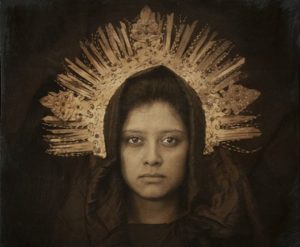Bartolomé de las Casas, described as the “founder” of human rights, was a controversial figure serving on the frontlines of the encounter between Spain and the New World during the sixteenth century. Las Casas was born in Sevilla, Spain, in 1484. Early in his teenage years his father and uncle, along with many other Spaniards, joined Columbus on his second journey to the Americas in search of newfound wealth. At the age of 14 Las Casas began studies in preparation for the priesthood. In 1502, at the age of 18, he received minor orders and embarked on his first trip to the Caribbean island of Hispaniola (now Haiti and the Dominican Republic) with 2,500 men and women to establish a permanent settlement. On April 15, 1502, he arrived in Santo Domingo, where, in addition to overseeing his father’s land and laborers, he was given his own land and 100 indigenous laborers by the Spanish governor.
In 1507 he was ordained as a priest in Rome, Italy. In a visit with Pope Julius II he informed the pontiff of the opportunity to convert the “natives” in the New World. He returned to Hispaniola as an Indian doctrinero, the official catechist to the Indian population.
In September 1510, the first Dominicans arrived in Hispaniola. After witnessing the deplorable treatment of the indigenous peoples on Hispaniola and the encomienda system—enslavement of the indigenous people by the Spanish for labor and mining for gold—Friar Antón Montesino, a Dominican priest, preached a famous speech on December 21, 1511, denouncing the encomienda system as a mortal sin.
In 1514 Las Casas witnessed the tragic massacre of indigenous American leaders at the hands of the Spanish. He abhorred the killings and atrocities committed against the indigenous people, and on Pentecost of 1415, he renounced his ownership of indigenous laborers and the encomienda system. Like many of the Dominican friars, he began to preach again the injustices of the encomienda system and Spain’s tyranny. Regent and Cardinal Ximénez de Cisneros, who consequently promoted the crusades in North Africa, gave Las Casas the title “Protector of the Indians.” Las Casas became an advocate for the humane treatment of the indigenous people in the Americas. He, along with other Dominican friars, dedicated their lives to reforming Spain’s encomienda system. Las Casas, launching a campaign for indigenous rights, labored to convince the Spanish king that Spain’s mission to spread Christianity in the Americas should not deprive the indigenous population of their freedom, sovereignty, and property rights.
In 1522, Las Casas entered the Dominican order in Hispaniola.He traveled between Hispaniola and Spain continuing his campaign to expose the abuses suffered by the indigenous population under the encomienda system and to reform Spanish laws. His campaign influenced the New Laws of 1542, which prohibited the enslavement of indigenous people, called for the establishment of institutional mechanisms to protect indigenous people from labor abuses, and called for an end of the encomienda system. Las Casas faced many controversies, including charges of high treason against Spain from detractors. However, his campaign had already left its mark on the New Laws of 1542 and helped to bring about the decline of the encomienda system.
Scholars propose that Bartolomé de las Casas had two conversion experiences: first he renounced his ownership of indigenous laborers and the encomienda system, and second he joined the Dominican order. Las Casas later wrote that the blinders fell from his eyes and he saw that everything the Spaniards had done in the Indies from the beginning—all the brutal exploitation and decimation of innocent Indians, with no heed for their welfare or their conversion—was not only completely wrong, but also a mortal sin. In his last words, he professed that he had kept faith, during fifty years of untiring labor, with the charge that God had laid upon him to plead for the restoration to the Indians of their original lands, liberty, and freedom. Las Casas’ ideas continue to influence us today. In November 2008, Oxford University founded the Las Casas Centre for Human Rights. The Institute aims to examine difficult questions in the spirit of dialogue, mutual respect, and friendship that is central to the Dominican intellectual tradition, enquiry, and disputation.

